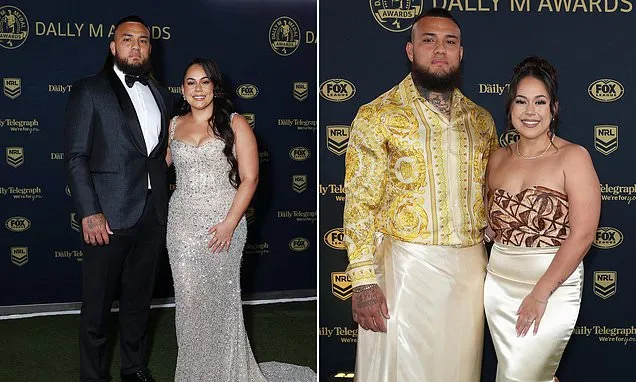NRL star Addin Fonua-Blake has revealed an unusual go-to meal of his after an encounter with a world-famous influencer this week.
Japanese-Irish influencer Yuji Beleza, who has six million followers on Instagram and 7.5 million on TikTok, makes videos featuring him surprising people by speaking to them in their native language.
The 27-year-old claims he can speak about 30 languages, including English, Japanese, Russian, German and Turkish.
He saw the Cronulla Sharks front-rower coming out of a motel and tried to test his Tongan.
Fonua-Blake was wearing a Los Angeles Lakers jersey and Beleza asked him if he was Tongan and a basketball player.
'No, rugby league,' Fonua-Blake said.
Fonua-Blake (pictured with wife Ana) told Beleza that he likes eating a traditional Tongan dish made with horsemeat
'Do you play for Tonga?' Beleza asked.
Fonua-Blake explained that he not only plays for Tonga but is the captain of the national side.
Beleza, speaking to Fonua-Blake in Tongan, asked him if he eats horsemeat.
Fonua-Blake said he did, often having it with coconut cream, onions and the root vegetable taro in a traditional dish called lo'i hoosi.
'Thank you @_afb95,' Beleza said on Instagram. 'So good to meet you,' Fonua-Blake wrote back.
'So impressive. How awesome you've come across a Tongan, a well-known one too to do this interview with,' one person wrote.
Some Tongans eat horsemeat, a practice they have retained through cultural tradition.
The practice is maintained both in Tonga and within Tongan communities abroad, often featuring at family gatherings and markets.
Fonua-Blake is enjoying the off-season after playing in the Pacific Championships
The Tongan dish lo'i hoosi (pictured) also features coconut cream
Kiwi shot-putter Dame Valerie Adams told how she found horsemeat to eat while in Europe
The meat is considered slightly sweeter than beef - tender, high in protein and low in fat.
Many other nationalities eat horsemeat too.
New Zealand Olympic great Dame Valerie Adams recently raised some eyebrows by taking to TikTok to reveal she eats horsemeat.
Adams, a four-time World champion, and double Olympic gold medallist, explained how widespread the practice is.
'In Europe, eating horsemeat is quite natural. You can buy horse fillet from the butcher,' she said.
'I bought horse jerky in Switzerland when I was living there, it was quite normal.
'Don't knock it until you try it. It's actually quite tasty.'
In France, a horse head sign can still be seen outside butcheries dedicated to horsemeat.
A few butchers have obtained special licences to sell horsemeat within Australia, often catering to specific communities or for export.
Aussies mostly view horses as companion animals rather than livestock, which has led to a social stigma around horsemeat consumption.
